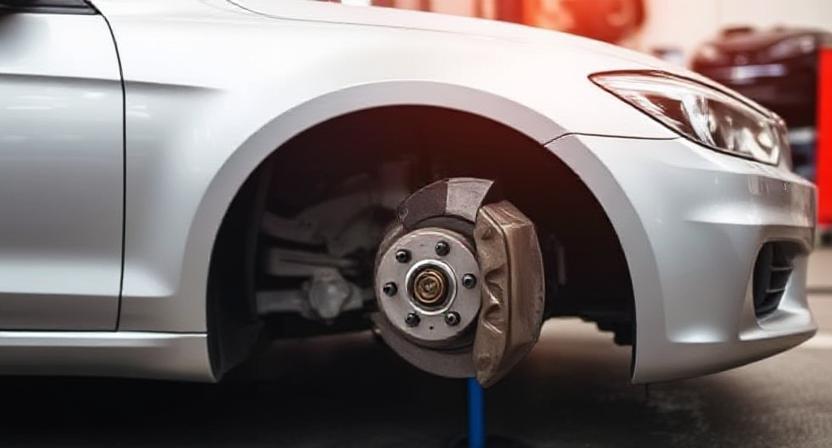Notifications

7 minutes, 20 seconds
-7 Views 0 Comments 0 Likes 0 Reviews

Whether you're hearing strange noises, noticing unusual vibrations, or dealing with warning lights on your dashboard, car problems rarely come at a convenient time. Some issues can be minor, while others can signal serious damage that requires immediate attention. In this guide, we’ll break down five common car problems: steering wheel vibration when braking, head gasket repair cost, blown car gasket, car won’t start, and oil leaking from car—what causes them, how to identify them, and what it typically costs to fix them.
If you’ve ever experienced steering wheel vibration when braking, it can be both annoying and alarming. This problem often indicates something is wrong with your braking system or suspension components.
Warped brake rotors: As rotors heat up and cool down repeatedly, they can become uneven, causing the brake pads to grip inconsistently and create vibration.
Uneven brake pad wear: Low-quality or worn-out pads may not apply pressure evenly across the rotor.
Loose suspension parts or misalignment: These can amplify the vibrations, especially at higher speeds or during braking.
Have a mechanic inspect your rotors and pads for wear or warping. In many cases, replacing the rotors and pads resolves the issue. If suspension components are involved, further diagnostics may be necessary.
When it comes to major engine repairs, few are as dreaded as a head gasket repair. The head gasket repair cost can vary widely depending on the make and model of your car, but it’s often on the high end due to labor intensity.
The head gasket seals the engine block and cylinder head, preventing coolant and oil from mixing and maintaining compression. If this seal breaks, it leads to serious engine problems.
Economy cars: $1,000 – $1,500
Luxury vehicles or complex engines: $2,000 – $3,500+
Repairing a head gasket often involves disassembling a large portion of the engine, which takes time and requires precision. Parts themselves are usually affordable—the labor drives the cost up.
A blown car gasket—usually referring to a blown head gasket—is a critical failure that should never be ignored. It can cause overheating, loss of engine power, and eventually, total engine failure.
White smoke from the exhaust (coolant burning in the combustion chamber)
Milky oil (coolant mixing with oil)
Overheating engine
Bubbling in the radiator or coolant reservoir
Loss of power or poor acceleration
If you suspect a blown car gasket, stop driving the vehicle immediately to prevent further damage. A compression test or chemical test can confirm the diagnosis.
When your car wont start, it can be due to a wide variety of causes—some simple and some complex. Start with the basics, then move on to more advanced checks if necessary.
Dead battery: The most common cause. Try jump-starting.
Bad starter motor: You may hear a clicking sound but the engine won’t crank.
Faulty ignition switch: No dashboard lights or engine activity.
Empty gas tank or fuel system failure: Check the fuel gauge and listen for the fuel pump.
Anti-theft system issues: Sometimes, immobilizers prevent starting if they detect a key issue.
Check for obvious signs like dim lights or a clicking sound. If a jump-start works, it’s likely the battery. If not, a tow to a repair shop or mobile mechanic may be necessary for a deeper diagnosis.
Noticing oil leaking from car is a problem that should never be ignored. Oil lubricates critical engine parts—running low or dirty can cause major internal damage.
Puddles under the engine after parking
Burning oil smell while driving
Blue smoke from the exhaust
Low oil levels or frequent top-offs required
Oil filter or drain plug
Valve cover gasket
Oil pan gasket
Rear main seal
Minor leaks may only require a gasket replacement, while larger issues like rear main seal failure may require removing the transmission. Always clean the area after repair to monitor if the leak returns.
These five car issues—steering wheel vibration when braking, head gasket repair cost, blown car gasket, car won’t start, and oil leaking from car—are some of the most common and serious symptoms drivers face. Recognizing them early can save you from bigger repair bills and potentially dangerous situations.
If your steering vibrates, get your brakes and rotors checked immediately.
A head gasket failure is costly—overheating is often the first warning sign.
Don’t ignore oil leaks; they can quietly destroy your engine over time.
If your car won’t start, start simple—check the battery, then work your way up.
Preventative maintenance is always cheaper than emergency repairs.
Being proactive with car maintenance and responding quickly to problems will help keep your vehicle safe, reliable, and on the road for years to come.

